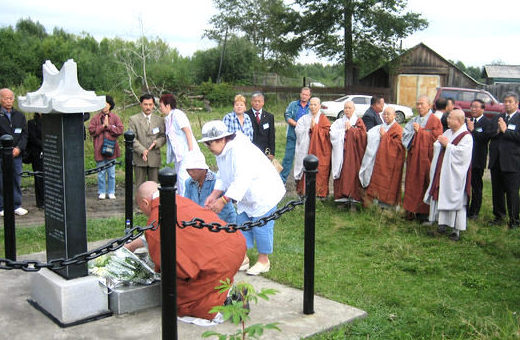 |
|
A memorial is being held at the tombstone established at the spot where 16 Koreans were killed by Japanese police. The ceremony, held September 7, was attended by around 30 Koreans and locals.
|
16 Koreans killed by Japanese police after end of WWII
"This is a record to pay tribute to our fathers and brothers killed by Japanese officials, and to let the world know about the massacre." So reads a tombstone in Poronaisk, a small village in Sakhalin, eastern Russia.
A memorial service was held in Poronaisk on September 7 for 16 Koreans killed on August 17, 1945 by Japanese police, just after Japan lost the Second World War. Those killed had been accused of espionage against the Japanese empire. The fleeing Japanese shot all of them to death in a local government office, then set the building on fire to destroy the evidence.
The so-called Poronaisk massacre did not come to light until 1992, when trial and investigation records on the incident were found in Russia. According to the records, it was Lee Du-bok, a Korean, who tipped off Japanese police about the alleged espionage. Two Japanese police officers then used Type 38 rifles to kill the 16 Koreans. It was not until this year that the incident was confirmed and South Koreans found out about the massacre.
Handcuffs and a skull with a bullet wound were all that was found at the site.
The memorial service was attended by 20 representatives from South Korea and 10 locals. Kim Gyeong-sun, who built the tombstone in memory of the dead and has devoted herself to informing the world about the incident, was among them. "Though belatedly, I want people to know the historical facts, and remember those who were killed," Kim said. Her father and brother were among those lost. "We were shocked to learn that such an atrocity took place here," said Buddhist Monk Beopta, who led the delegation to the memorial service. "We will have to do our best to get to the bottom of the incident." He urged Japan to repent for what happened during its colonial rule of the Korean peninsula.





